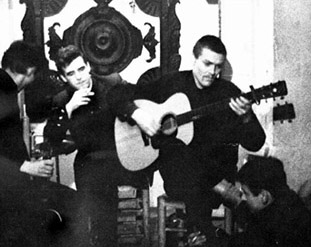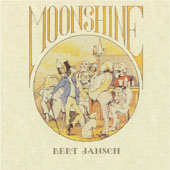| John Renbourn | ||||
|---|---|---|---|---|
 | ||||
| Studio album by John Renbourn | ||||
| Released | 1966 | |||
| Recorded | 1965 | |||
| Genre | Folk | |||
| Label | Transatlantic | |||
| Producer | Nathan Joseph | |||
| John Renbourn chronology | ||||
| ||||
| Review scores | |
|---|---|
| Source | Rating |
| Allmusic | |
John Renbourn is the debut album by John Renbourn. [1]
| John Renbourn | ||||
|---|---|---|---|---|
 | ||||
| Studio album by John Renbourn | ||||
| Released | 1966 | |||
| Recorded | 1965 | |||
| Genre | Folk | |||
| Label | Transatlantic | |||
| Producer | Nathan Joseph | |||
| John Renbourn chronology | ||||
| ||||
| Review scores | |
|---|---|
| Source | Rating |
| Allmusic | |
John Renbourn is the debut album by John Renbourn. [1]
All tracks composed by John Renbourn, except where indicated.

Pentangle are a British folk-jazz band with an eclectic mix of folk, jazz, blues and folk rock influences. The original band was active in the late 1960s and early 1970s, and a later version has been active since the early 1980s. The original line-up, which was unchanged throughout the band's first incarnation (1967–1973), was Jacqui McShee (vocals); John Renbourn ; Bert Jansch ; Danny Thompson ; and Terry Cox (drums).

Herbert Jansch was a Scottish folk musician and founding member of the band Pentangle. He was born in Glasgow and came to prominence in London in the 1960s as an acoustic guitarist and singer-songwriter. He recorded more than 28 albums and toured extensively from the 1960s to the 21st century.

John Renbourn was an English guitarist and songwriter. He was best known for his collaboration with guitarist Bert Jansch as well as his work with the folk group Pentangle, although he maintained a solo career before, during and after that band's existence (1967–1973). He worked later in a duo with Stefan Grossman

David Michael Gordon "Davey" Graham was a British guitarist and one of the most influential figures in the 1960s British folk revival. He inspired many famous practitioners of the fingerstyle acoustic guitar such as Bert Jansch, Wizz Jones, John Renbourn, Martin Carthy, John Martyn, Paul Simon and Jimmy Page, who based his solo "White Summer" on Graham's "She Moved Through the Fair". Graham is probably best known for his acoustic instrumental, "Anji" and for popularizing DADGAD tuning, later widely adopted by acoustic guitarists.
Bill Leader is an English recording engineer and record producer. He is particularly associated with the British folk music revival of the 1960s and 1970s, producing records by Paddy Tunney, Davey Graham, Bert Jansch, John Renbourn, Frank Harte and many others.
Terence William Harvey 'Terry' Cox played drums in the British folk rock bands The Pentangle, Duffy's Nucleus and Humblebums.

Raymond Ronald Jones, better-known as Wizz Jones, is an English acoustic guitarist, singer and songwriter. He was born in Thornton Heath, Surrey. England and has been performing since the late 1950s and recording from 1965 to the present. He has worked with many of the notable guitarists of the British folk revival, such as John Renbourn and Bert Jansch.

Cruel Sister was an album recorded in 1970 by folk-rock band Pentangle. It was the most folk-based of the albums recorded by the band, with all the tracks being versions of traditional songs. Whereas their previous album had been produced by Shel Talmy, and featured quite a heavily produced, commercial sound, Cruel Sister was produced by Bill Leader, noted for his recordings of folk musicians.

The Pentangle was the 1968 debut album of the band Pentangle: Terry Cox, Bert Jansch, Jacqui McShee, John Renbourn and Danny Thompson. It brought together their separate influences of folk, jazz, blues, early music and contemporary songwriting. One of the band's most commercially successful albums, it reached number 21 in the British charts.

Reflection was an album recorded in 1971 by folk-rock band Pentangle.

Solomon's Seal is an album recorded in 1972 by folk-rock band Pentangle. It was the last album recorded by the original line-up, before the band split in 1973. Jacqui McShee has stated that it is her favourite Pentangle album. The album title refers to the Seal of Solomon — a mythical signet ring with magical powers, sometimes associated with the pentagram symbol adopted by Pentangle.

Open the Door is an album by Pentangle. The band had split in 1973 and reformed in the early 1980s. By the time this album was recorded, John Renbourn had left the band to enroll in a music degree course and his place was taken by Mike Piggott. The other band members were unchanged from the original Pentangle line-up: Terry Cox, Bert Jansch, Jacqui McShee and Danny Thompson. It was produced by John Chelew.

L.A. Turnaround is the ninth album by Scottish folk musician Bert Jansch, released in 1974.

It Don't Bother Me is the second album by Scottish folk musician Bert Jansch, released in November 1965. The album was produced by Nathan Joseph and Bill Leader, although Leader was left uncredited.

Moonshine is the eighth album by Scottish folk musician Bert Jansch, released in 1973.
Folk baroque or baroque guitar, and also sometimes called chamber folk, is a distinctive and influential guitar fingerstyle developed in Britain in the 1960s, which combined elements of American folk, blues, jazz and ragtime with British folk music to produce a new and elaborate form of accompaniment. It has been highly important in folk music, folk rock and British folk rock playing, particularly in Britain, Ireland, North America and France.
"Goodbye Pork Pie Hat" is a jazz instrumental composed by Charles Mingus, originally recorded by his sextet in 1959 and released on his album Mingus Ah Um. It was subsequently released on his 1963 album, Mingus Mingus Mingus Mingus Mingus as "Theme for Lester Young" and 1977's Three or Four Shades of Blues. Composed in E-flat minor, Mingus wrote it as an elegy for saxophonist Lester Young, who had died two months prior to the recording session and who was known for wearing unusually broad-brimmed pork pie hats. These were "busted down" by Young himself, from hats that might better be described as Homburgs, but which he only purchased in "Negro districts". This was since, according to an interview with Young in the November 1949 edition of Our World, "You can't get the right type in a 'gray' neighborhood".

Live 1994 is a live album by Pentangle, released in 1994. It was reissued along with One More Road on CD in 2007.

Bert Jansch was a Scottish folk musician. His discography consists of 24 studio albums, 8 live albums, 36 compilations, 5 videos, 2 EPs, and 12 singles. In addition, his compositions and guitar work have been featured on a number of albums by other artists.

John Renbourn was an English guitarist and composer. His discography consists of 20 studio albums, 5 live albums, 19 compilations, and 2 videos. In addition, his compositions and guitar work have been featured on a number of albums by other artists.